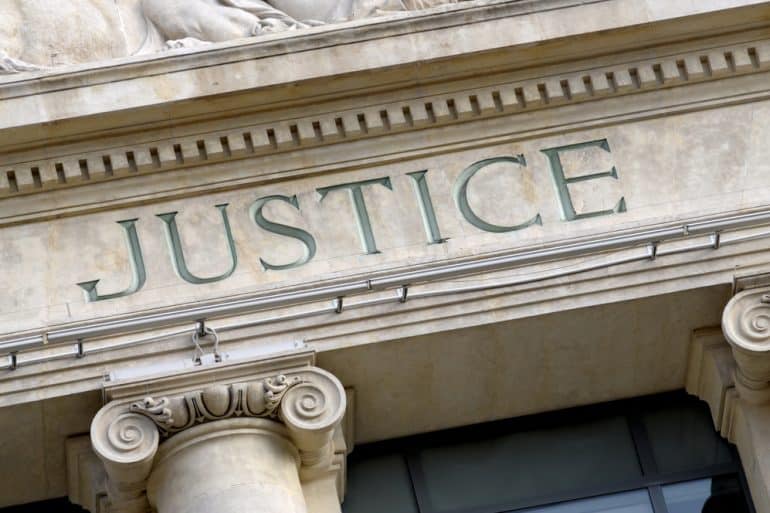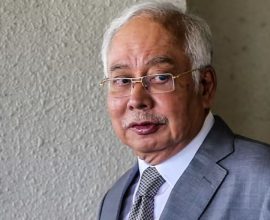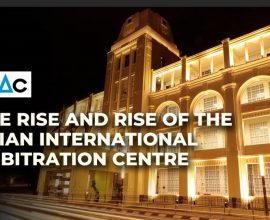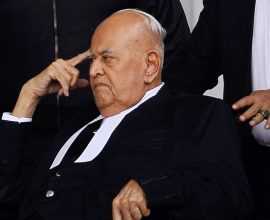Will a Royal Commission guarantee a squeaky-clean, independent judiciary?
Will the formation of a Royal Commission heal the Judiciary’s deathly fever?
In many ways, the story of the judiciary is the story of Karpal.
Karpal Singh was a long-time opposition leader in Malaysia. He had several epithets:
‘Defender of the little man,’ 1Vatikiotis, Michael (1993),‘A Malaysian who dared sue a King’2 Far Eastern Economic Review. 156(20): 78] and, ‘A Friend to the oppressed and marginalised.’3[“Durable and obdurate”. The Star. 25 July 2010].
Karpal spoke strongly against oppression and inequality. For this he was severely repressed by the BN government. He bore his tribulations stoically, and soldiered on.
Along with a few intrepid lawyers and judges (see here), Karpal shaped Malaysia and the law.
“Karpal also brought the best out of the judiciary. By his arguments, he helped the judiciary uphold the rule of law.
He paid a heavy price for it – as did some judges, during the 1988 Judicial Crisis (see here), and after.
But Karpal didn’t care. He fought every inch: hand, tooth and nail.
Tragically, he was killed in a car accident on 17th April, 2014.
We are too close to history to understand his contributions to the nation, or appreciate the severity of the sacrifices he made in that journey.
He was not just any politician: he was, in himself, an institution. He is almost revered in Malaysia.
The nation misses his quiet but implacable spirit.
It is of this man, and the Institution he rested his fate on that we shall speak of today.
How this fiasco began
In 2008, there was a constitutional crisis in the State of Perak. The Opposition won. Three members of Perak’s Legislative Assembly became amphibians. They hopped over to the ruling party, BN. It had, for half a century, controlled the Federal Government, and a vast majority of the states.
The Chief Minister requested the Ruler to dissolve the Assembly. He was quite entitled to do so: [Article 16(6), Perak Constitution].
The Sultan did something unusual.
His Majesty interviewed the 31 members of the Legislative Assembly. After these interviews, the Sultan asked Nizar and his Executive Council to resign. BN formed a new government.
Karpal is charged for sedition
Being a lawyer and an MP, Karpal thought the Opposition and Nizar had been hard done by. He thought they were subjected to an ultra vires act. In February 2009, he made several remarks at a press conference. He said the affected parties might sue the Ruler for acting outside the state Constitution.
The ruling BN Government accused Karpal of ‘threatening the Ruler’.
Karpal was charged for sedition.
Karpal is acquitted
The trial court thought that Karpal’s words were not seditious. Refusing to call for the defence, the trial judge dismissed the charge.
The prosecution appealed.
The Court of Appeal said the trial should continue. It sent the case back for trial.
Karpal is convicted
Karpal was eventually found guilty of sedition. An appeal was, again, filed at the Court of Appeal.
By this time Karpal had passed on. So his wife, Madam Gurmit Kaur, brought the appeal.
At the second appeal, the Court of Appeal upheld his conviction.
A final appeal is now pending at the Federal Court.
A lawyer’s allegation
In August 2018, a lawyer, Mohamed Haniff Khatri Abdulla, claimed that two out of three judges in the second Court of Appeal panel had decided to acquit Karpal. He alleged that ‘a judge’ had meddled in the decision to acquit Karpal. He said, “The [Court of Appeal] panel was asked to reverse the ruling.”4https://www.freemalaysiatoday.com/category/nation/2018/08/22/senior-judge-interfered-in-karpals-sedition-appeal-says-lawyer/
Sangeet’s Suit against the Chief Justice
Karpal’s daughter Sangeet sued the Chief Justice of the Malaysian Federal Court.5On 14 January, 2019 She complained that CJ Malanjum had failed to investigate two separate allegations of judicial interference.
One was in the Karpal Singh case; the other concerned a Hindu lady’s case, M. Indira Ghandi.
A Judge’s Exposé
Then came Justice Hamid Sultan Abu Backer’s affidavit on 14 February 2018.
It ran to of 63 pages and 152 paragraphs.
Hamid Sultan said he considered the deposing of the affidavit, a ‘Jihad’: he explained it as ‘struggling with a praiseworthy aim’.
He says he prepared the draft of the affidavit while performing his Umrah (a religious pilgrimage to Islam’s holiest sites) “… at ‘the Grand Mosque, Mecca, praying sincerely this affidavit will help … [Malaysia] … to clean [up] the judiciary through a process of RCI’.6Hamid Sultan Affidavit, page 62, paragraph 150
He said he had made the affidavit to support Sangeet’s case.
He began by complaining of judicial interference in criminal cases involving opposition politicians.
Purloining Government Funds via Consent Judgements
Hamid then spoke of the Government entering into contracts with [companies controlled by] nominees of the [then] ruling party.
He said that the Government had no intention of honouring such contracts. The nominees would then sue the Government.
The parties would agree to a compensation.
They would enter into a consent judgement.
A ‘consent judgement’ was an agreement parties, made before a court of law. Courts always uphold the bargain of the parties. No one could appeal against a consent judgement.
If one party refused to pay up, the other could take legal action – it is called ‘enforcement’.
After the consent judgement, the Government paid-off the nominees; all nice and pat.
Who would dare question a court order? Court orders are sacrosanct. They have to be obeyed.
The implication was that the previous ruling coalition’s nominees had purloined government of funds through improper consent judgements.
The Hamid affidavit was filed on 14 February 2019.
Most observers have not missed the timing of the affidavit: the Second Session of the Malaysian Parliament begins on 11 March 2019, in about three weeks. The Semenyih by-election is not too far off.
Hamid Sultan’s affidavit raises a whole miasma of uncertainty over the judiciary.
Earlier Complains of other judges
These complaints are, in themselves, neither new, nor unforeseen. We have seen quite a bit.
There was the 1988 Judicial Crisis. We lost our Lord President and two outstanding judges.
Then came the revelations of KC Vohrah JCA, who complained of judicial interference.
In 1996, there exploded far more damning accusations. These were contained in a letter allegedly written by Syed Idid J., another high court judge.
Comprising 33 pages, the letter described 112 judicial improprieties. These were replete with facts.
The then AG, Mohtar Abdullah, was stung into action. He issued a public directive to the police to ‘ferret out’ and ‘bring to justice’ the ‘conspirators and ‘brutish beasts.’
Mohtar Abdullah then famously said:
“The investigation is aimed at striking at the venomous elements that are out to discredit the judiciary and subvert justice in our beloved country”.
Kit Siang called it AG Mohtar’s ‘Ides of March’.7Lim Kit Siang, in https://www.malaysiakini.com/news/291116
That tirade resulted in Idid’s hasty removal.
The subjects of Idid’s patriotic complaints led – precisely – nowhere.
“So, those who suffered the fate of judicial removal were good people. This is often overlooked.
Naïvete
That the pious belief – that ‘Once an RCI has been set up, we will solve all the problems in the judiciary’ – is a naïve, unworkable view , will soon become apparent – unless something else is done.
So – What Next?
If the government decides not to investigate these allegations, it will confront public uproar. So it will set up an RCI. It is but a matter of time.
Three kinds of investigations may take place.
Investigation by the Judiciary?
The judiciary could investigate these complaints. The Chief Justice says he could not act against the alleged ‘top’ Judge because he has retired.8See affidavit filed in reply on 1 February 2019 By the CJ’s Special officer to the Chief Justice of the Federal Court of Malaysia
Since Karpal’s appeal is pending at the Federal Court, the CJ says that he had merely ‘suspended’ and ‘not discontinued’ any internal enquiry. This way, he says, there would be no prejudice to the “ongoing police investigation and the pending appeal”.
So the judiciary ‘cannot act’.
Investigation by Government Agencies?
The government can do one of two things: ask its enforcement agencies (e.g. MACC, or the Police) to investigate.
Previous complaints by judges have not galvanised the enforcement agencies into any kind of enthusiastic ‘ferreting’: so, dead end there.
It can also request the King to convene a Royal Commission of Inquiry.
Royal Commission of Inquiry?
Under the Commissions of Enquiry Act 1950 (CEA), the King may appoint a commission authorising it to enquire into any matter ‘for the public welfare’.9section 2 (1) (d) CEA
The Commission does not have very much power. It can demand for, and receive, the attendance of any person It can take evidence. It can ask for the production of anything in a person’s possession.10section 8 (a) to (h)
After hearing the complaints, there are only one of two recommendations the Commission can make.
One is that no evidence establishes the complaints.
Or the Commission may conclude that some wrong has been committed.
If so, all it can do is to ‘recommend’ to the King (meaning the Government) what steps it should take.
Such recommendations do not bind the Government.
What should be its Terms of Reference?
Assuming the King appoints the Royal Commission, what would be its terms of reference?
The terms of reference must be as broad-based as possible – there must be at least two elements to it.
The first would be to investigate the Sangeet Kaur and Hamid complaints.
If there is evidence of wrongdoing, the RCI should recommend the King what action is to be taken:
e.g. that the wrongdoers be charged in court for any criminal offence under written law, or for common law offences (e.g. ‘treason, unfaithfulness to the law of the land, corruption in office, other high crimes; ‘reckless disregard of duty’,11Burmel or ‘violation of public trust’. (For details, see an earlier article on Parliamentary Impeachment).
An RCI with a narrow set of parameters will not serve any purpose.
Suppose it was only authorised to ‘Investigate if the complaints of Sangeet Kaur and Justice Hamid Sultan are true, and if so, make appropriate recommendations – and stop there.’
Then, the whole purpose of establishing an RCI would be defeated by so narrow a remit.
Recommend Complete Measures for an Independent & Efficient Judiciary
The second aim would be to recommend measures for the judiciary’s wholesale improvement.
This should be the major, if not the sole aim, of the Commission’s work.
If the RCI’s Terms of Reference do not include this major element, then judicial misconduct will continue, and the judiciary will continue to languish. That is for sure.
If RCI convened, how should the Judiciary be overhauled?
A previous article discusses this extensively: ‘Time to Rebuild the Judiciary’. It will be oppressive to set out the details here.
Who should sit in the Royal Commission?
The Government often appoints retired and serving judges onto Royal Commissions. Non-judges and non-lawyers will find it difficult to investigate judicial misconduct.
The persons under query may speak a great deal about law and legal procedure.
It could get quite technical. So senior judges and lawyers are necessary.
Yet the involvement of local judges, whether serving or retired, will raise appearance of bias.
Even judges with impeccable reputations may suffer the rakyat’s suspicion that they would end up protecting the fat cats in the judiciary.
Foreign Judges?
The belief that foreign judges will exhibit a greater sense of independence and integrity is not supported by our recent history.
During the 1988 Judicial Crisis, two tribunals were established.
The First heard the complaint against the Lord President, Tun Salleh Abas.
The Second Tribunal heard the complaints against the five fearless Supreme Court judges: Tan Sri Azmi Kamaruddin, Tan Sri Eusoffe Abdoolcader, Tan Sri Wan Hamzah Mohamed Salleh, Tan Sri Wan Suleiman Pawanteh and Datuk George Seah.
Foreign Judges sat in both tribunals.
Ranasinghe CJ, (Chief Justice of Sri Lanka), and Sinnathuray J, (a judge of the Singapore High Court) were part of the First Tribunal.
The Second Tribunal had Mark Fernando J. (a Judge of the Supreme Court of Sri Lanka), and P. Coomaraswamy J (a Judge of the High Court of Singapore).
The First Tribunal
The First Tribunal’s actions do not inspire confidence. Rejecting Tun Salleh Abas’ request for a public hearing, and refusing his request for his counsel Anthony Lester QC to appear before it, the Tribunal only allowed an adjournment of a mere two days.
“The whole process smacked of unseemly haste”.12Lee, H.P., ‘A fragile bastion under siege – the 1988 convulsion in the Malaysian Judiciary’, Melbourne University Law Review [Vol.17, June 1990]
The First Tribunal’s report has been described by a Queen’s Counsel as ‘the most despicable document in modern history’.13Geoffrey Robertson, Q.C., ‘Justice hangs in the balance’, The Observer, 28 August 1988
Tun Salleh Abas refused to appear before it.
The First Tribunal said his absence cast “an extremely onerous duty” upon it, and “[called] for [our] most anxious consideration”.
Yet the Tribunal did not study the evidence with any great care.
It has been said that, “the actions of the Tribunal belied its words”, and that its self-styled ‘extremely onerous’ duty was “discharged in a most superficial manner.”14Lee HP, Ibid, at page 404, last paragraph
It was said that, “The Report of the (First) Tribunal thus carried its own death wound.”15Ibid, at page 406, first paragraph
The Second Tribunal
The Second Tribunal fared no better.
Its decision has been called ‘perverse’,16Lee, HP, Ibid page 409 ‘unconvincing’,17Trindade, F.A., op. cit. 80-5; also, Lee at p 410 ‘bizarre’,18Lee at p 410, Ibid, last paragraph and its reasoning ‘incredulous’19Lee at p 411, Ibid, second paragraph) and ‘highly questionable’.
The second tribunal has been accused of a ‘perplexing failure’.20Lee at p 411, Ibid, last paragraph
A Foreign Judge is no guarantee of Impartiality
The tribunals eventually recommended the removal of Lord President Salleh Abas, and two Supreme Court Judges, Tan Sri Wan Pawan Teh and Datuk George Seah. These tribunals – and their recommendations – have, to this day, drawn the terrible and uniform criticism of international jurists.
So a foreign judge sitting in a Royal Commission is no guarantee of righteous judging.
How have other Royal Commissions fared?
Of the 13 Royal Commissions established in the past, four remain in the minds of the public. They do not inspire us to rush to form a Royal Commission.
The Royal Commission for Police Reform (2004), went south, and still remains there. Nothing happened. [See here two articles on: ‘Who will Police the Police?’ Part-1 and Part-2 for details].
In the RCI into the Lingam Video Clip (2007–2008), lawyer VK Lingam testified that he could not remember the details of an alleged video of him ‘fixing’ judicial appointments. He said he may have been drunk. He denied any ‘fixing’. Anwar Ibrahim later released a new video. It purportedly showed Lingam speaking of having dinner with – and buying an expensive gift for – a former Chief Justice. Anwar has publicly complained of being disappointed that the RCI – which had focused solely on the ‘fixing of judges’ – did not allow evidence that ‘court decisions had also been fixed’.21The Star Online: https://web.archive.org/web/20110521094910/http://thestar.com.my/news/story.asp?file=%2F2008%2F1%2F30%2Fnation%2F20167174&sec=nation)
The RCI into the Teoh Beng Hock case (2010) reported that he had ‘committed suicide’. A coalition of NGOs have described the report as a ‘washout’. A former Court of Appeal Judge, NH Chan has said that the RCI’s conclusion were ‘unsupported by evidence’. He called the members of the RCI, ‘three blind judges’, and equated them to the infantile ditty, ‘Three blind mice, three blind mice, who had their tails cut off’.22https://blog.limkitsiang.com/2011/08/08/who-killed-teoh-beng-hock/#more-15182)
That Report drew so great a public ire, that criticism of it has not abated to this day.
The RCI on Illegal immigrants in Sabah (2012–2014), agreed that ‘Project IC’ had in fact existed, but unaccountably determined that, ‘Political parties were not involved in the granting of citizenship to illegals’. They did find that, ‘Corrupt officials were partly at fault.’ What happened thereafter is unclear. It still remains a question mark.
An RCI should not become just another Roman theatre
To entertain their restive citizenry, Roman kings organised elaborate games. In their coliseums the citizenry watched men sacrificed to ravenous beasts. Then they returned home to a hot meal and a warm bed: and forgot all about it the next day.
Unless an RCI is guided by a useful set of aims, and peopled by serious individuals, it will merely entertain a public hungry for facts.
“A poor RCI will bring neither life – nor lasting honour – to a judiciary languishing in a deathly fever.
When public clamour dies away, and things quieten down, the judiciary – despite the valiant attempts of a few – will continue its downward spiral.
If this happens, we would, as a nation, do no justice to Karpal Singh at all; nor indeed to the other five Supreme Court judges – who cast away their professional lives and reputation in the hope of building a better nation.





